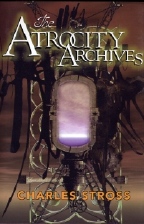The Atrocity Archives
Charles Stross
Golden Gryphon
US Hardcover First Edition
ISBN 1-930-84625-8
Publication Date: 05-01-2004
274 Pages; $24.95
Date Reviewed: 08-04-04
Reviewed by: Rick Kleffel © 2004

REFERENCES
COLUMNS
|
|
|
The Atrocity ArchivesCharles StrossGolden GryphonUS Hardcover First EditionISBN 1-930-84625-8Publication Date: 05-01-2004274 Pages; $24.95Date Reviewed: 08-04-04Reviewed by: Rick Kleffel © 2004 |
|
|
REFERENCES |
COLUMNS |
Who knows what to believe anymore? As one bizarre revelation after another rolls out from the fluorescent hallways of our intelligence services, as one truth is discovered to be a lie while another lie proves to the be the truth, as facts prove un-checkable and proofs check in as counter-factual, we have only the words on a printed page to consult -- so long as they're not printed in invisible ink. There's little that we're told about the activities of those who watch over us, spy on us, or spy on others that we're not willing to believe. The PATRIOT Act used to shut down a Stargate Fan website? Check. Remote viewers employed by the CIA to spy on aliens as they zip about the Earth's atmosphere in their flying saucers? Check. A secret division of British intelligence devoted to suppressing the mathematics behind magic that really works? You'll find that documentation only in 'The Atrocity Archives' by Charles Stross. But check any copy you buy carefully before plunking down your money. Make sure it's not one of the many in which the best bits have been redacted by Those Who Have Only Our Best Interests In Mind. Of course that happened. Would I lie to you?
Not when it comes to books, I wouldn't. 'The Atrocity Archives' sounds pretty gruesome, but it's not the horror show the title suggests. It includes the short novel 'The Atrocity Archive', originally serialized in Spectrum SF, an additional brand-new novella ('The Concrete Jungle'), an introduction by Ken Macleod ('Charlie's Demons'), an afterword by Charles Stross ('Inside the Fear Factory') and a multi-page 'Glossary of Abbreviations, Acronyms and Organizations'. The book does live up to the plurality of its title. But 'The Atrocity Archives' turn out to be more fun than the grim moniker might suggest.
In 'The Atrocity Archive', Bob Howard is the prototypical desk-jockey who just wants a shot at active duty. Up until recently, he was the Laundry's tech guy. This Laundry doesn't whitewash clothes; it cleanses reality itself, of those pesky demons and Lovecraftian entities that try to break through into everyday life, using the specialized math that collapses the barriers between parallel universes. Bob's first shot has him clambering around piles of floppy disks and re-formatting hard drives. His next job sends him to Santa Cruz, California, to interview a British scientist working in the states who may have stumbled on to some of those hazardous equations. Turns out the scientist is a beautiful redhead, and that's OK by Bob. It's not so OK when she's kidnapped to be used as a sort of human battery that will help open up a path through those difficult maths for some unfriendly beings. Bob intervenes and that's just the beginning.
'The Concrete Jungle' finds Bob assigned to a case that appears at first glance to be an obscure prank. But as he goes through a series of very cleverly told stories found in (what did you expect?) the archives, he finds there's quite literally much more than meets the eye. Starting out in the Greek myths and ending up in the computerized surveillance of the twenty-first century, 'The Concrete Jungle' kicks bureaucratic butt with a ripping tale of spy tradecraft and top-notch hacking.
In his entertaining afterword, Stross talks about the two poles between which this electrical storm of language arcs. On one hand, he claims that he's re-writing Len Deighton as if Cold War spy tales were existential horror. And on the other hand, he claims that he's re-writing Lovecraft as if Lovecraft's extra-dimensional terrors were nothing more than accurate intelligence. In reality, Stross is a true original, and what holds this Rube-Goldberg concoction together is his lively, humorous prose. Stross spews words like a hairy-eyed caffeine-addict computer-tech comedian on his fiftieth hour of uptime. He's constantly clever. What takes this beyond a mere comedic monologue are his high-quality, deep-thought conceptualizations. Stross tosses away intriguing ideas as if they were bits of popcorn falling out of the bin while he MST3K's whole schools of literature. 'The Atrocity Archive' and 'The Concrete Jungle' are so thick with intellectual riffs they're like those portraits created by thousands of miniaturized photographs. Call it fractal fiction.
Stross has a great ability to put the reader in one weird scene after another. Whether we're cowering outside of a high-tech hideout or crouching in a cave on the coast of nineteenth century India, Stross has the ability to slap the reader about in space and time. Once there, Stross occasionally rattles on like a frothing computer geek. As a certified frothing computer geek, I found these passages charming. Those who are not may find them trying, though Stross leavens every word he writes with humor.
Reading 'The Atrocity Archives' is sort of the linguistic equivalent to surfing the huge waves of Half Moon Bay with Robin Williams tied to the back of your surfboard. It's exhilarating, frightening, mind-blowing and exhausting. It's more entertaining than anything as weird as itself. You'll find yourself in fits of hysterical laughter and deep thought while teetering on the edge of an abyss. It's an exciting, unpredictably wild ride. Don't just stay on the beach, watching the rest of us do it. Take the leap. Believe the words. Would I lie to you?